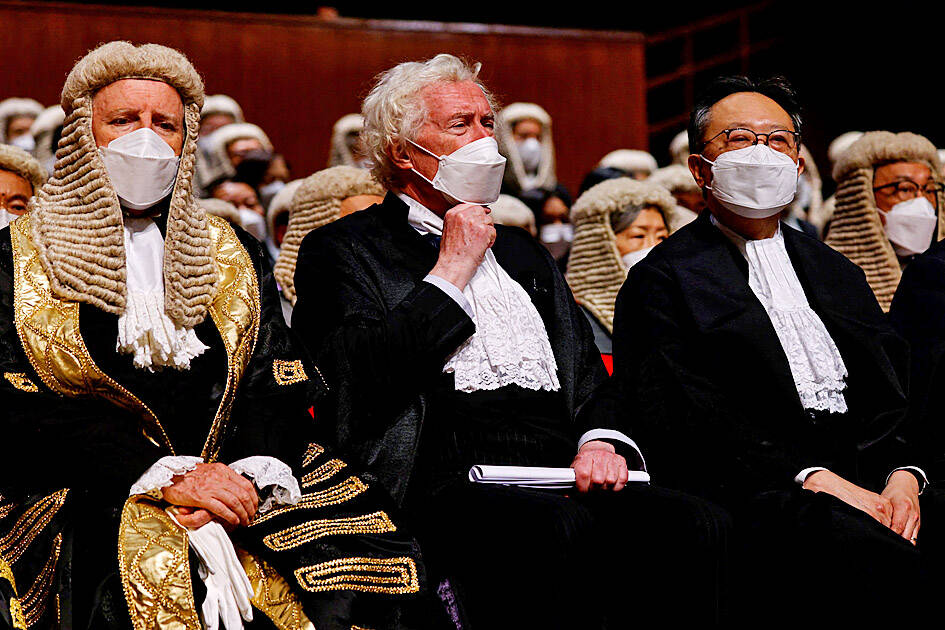A former chief justice of the Supreme Court of Canada is stepping down from Hong Kong’s top court, local officials said on Monday, the latest overseas judge to resign from the court amid concerns about judicial independence.
Hong Kong’s judiciary confirmed that Beverly McLachlin would complete her term as a non-permanent overseas judge at Hong Kong’s Court of Final Appeal, without giving more details.
Canadian media outlets reported that McLachlin noted in her statement that she has reached 80 years of age and would retire from that position when her term ends next month.

Photo: Reuters
She said she intended to spend more time with her family and she continues to have confidence in the members of the court and their independence, the reports said.
Also on Monday, a British judge who resigned from the same court last week said he stepped down because the rule of law in Hong Kong is in “grave danger” and judges operate in an “impossible political environment created by China.”
Jonathan Sumption described a growing “paranoia of the authorities” and judges being intimidated by a “darkening political mood” in the territory in an article published by the Financial Times on Monday.
“Hong Kong, once a vibrant and politically diverse community, is slowly becoming a totalitarian state. The rule of law is profoundly compromised in any area about which the government feels strongly,” he wrote. “The least sign of dissent is treated as a call for revolution.”
He wrote that he remained on the court in the hope that the presence of overseas judges would help sustain the rule of law, but “I fear that this is no longer realistic.”
McLachlin and Sumption were the latest of several overseas judges who have quit Hong Kong’s highest court in recent years. Fifteen such judges served in 2019. About seven remain following McLachlin’s departure next month.
Hong Kong’s government expressed its strong disagreement with Sumption’s comments in a lengthy statement yesterday. It insisted that Hong Kong’s courts are not under any political pressure from Chinese authorities or the local government when handling cases, and said the rule of law has not declined.
Hong Kong Chief Justice Andrew Cheung (張舉能) said in a statement that any suggestion that judicial decisions have or could be compromised is a serious allegation and should not be lightly made.
He added that there is tension between protecting fundamental rights and safeguarding national security, but the territory’s judiciary is committed to both causes.
Hong Kong Chief Executive John Lee (李家超) doubled down in his weekly briefing, saying the professional duty of judges is to interpret and apply the law in accordance with legal principles and evidence, regardless of their political views about a certain law.
Lee also said some British officials and politicians have attempted to “weaponize” the UK’s judicial influence to target China and Hong Kong, and the territory should not allow that.
“It is sad and disappointing that our judges are abandoned by a few overseas counterparts and have been so unfairly treated,” he said.

GAINING STEAM: The scheme initially failed to gather much attention, with only 188 cards issued in its first year, but gained popularity amid the COVID-19 pandemic Applications for the Employment Gold Card have increased in the past few years, with the card having been issued to a total of 13,191 people from 101 countries since its introduction in 2018, the National Development Council (NDC) said yesterday. Those who have received the card have included celebrities, such as former NBA star Dwight Howard and Australian-South Korean cheerleader Dahye Lee, the NDC said. The four-in-one Employment Gold Card combines a work permit, resident visa, Alien Resident Certificate (ARC) and re-entry permit. It was first introduced in February 2018 through the Act Governing Recruitment and Employment of Foreign Professionals (外國專業人才延攬及雇用法),

WARNING: From Jan. 1 last year to the end of last month, 89 Taiwanese have gone missing or been detained in China, the MAC said, urging people to carefully consider travel to China Lax enforcement had made virtually moot regulations banning civil servants from making unauthorized visits to China, the Control Yuan said yesterday. Several agencies allowed personnel to travel to China after they submitted explanations for the trip written using artificial intelligence or provided no reason at all, the Control Yuan said in a statement, following an investigation headed by Control Yuan member Lin Wen-cheng (林文程). The probe identified 318 civil servants who traveled to China without permission in the past 10 years, but the true number could be close to 1,000, the Control Yuan said. The public employees investigated were not engaged in national

The zero emissions ship Porrima P111 was launched yesterday in Kaohsiung, showcasing the nation’s advancement in green technology, city Mayor Chen Chi-mai (陳其邁) said. The nation last year acquired the Swiss-owned vessel, formerly known as Turanor PlanetSolar, in a bid to boost Taiwan’s technology sector, as well as ecotourism in Palau, Chen said at the ship’s launch ceremony at Singda Harbor. Palauan President Surangel Whipps Jr and Minister of Foreign Affairs Lin Chia-lung (林佳龍) also attended the event. The original vessel was the first solar-powered ship to circumnavigate the globe in a voyage from 2010 to 2012. Taiwan-based Porrima Inc (保利馬) installed upgrades with

ENHANCE DETERRENCE: Taiwan has to display ‘fierce resolve’ to defend itself for China to understand that the costs of war outweigh potential gains, Koo said Taiwan’s armed forces must reach a high level of combat readiness by 2027 to effectively deter a potential Chinese invasion, Minister of National Defense Wellington Koo (顧立雄) said in an interview with the Chinese-language Liberty Times (sister newspaper of the Taipei Times) published yesterday. His comments came three days after US Secretary of State Marco Rubio told the US Senate that deterring a Chinese attack on Taiwan requires making a conflict “cost more than what it’s worth.” Rubio made the remarks in response to a question about US policy on Taiwan’s defense from Republican Senator John Cornyn, who said that Chinese